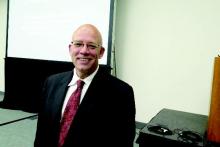SAN DIEGO – According to Dr. Jeffrey Wiese, one intangible trait to being an effective ward attending involves establishing and maintaining expectations for your team.
“As much as my life has been on focusing on the knowledge and the skills in the first 20 years of being an attending, maybe I missed the mark,” Dr. Wiese, now senior associate dean for graduate medical education at Tulane University, New Orleans, said at the annual meeting of the Society of Hospital Medicine. “Maybe the big thing that I should have been focusing more upon was how we socialize people into our profession. That is to say those common attitudes: how you see the world – a way of thinking, not a ‘what’ of thinking.”
If you own the expectations for your team, he continued, “culture is the shared roles, goals, expectations, and beliefs. It is what governs behavior when no one is looking. If you own the expectations and you can create shared beliefs, then you are in the game to optimize performance. And if you don’t have time to set the expectations, then you definitely don’t have time for what’s going to come next: the dysfunctional team.”
Dr. Wiese, who is also chief of the Charity Medical Service at Tulane, offered other tips for being a successful ward attending:
Deliver expectations with rationale. “Your team is coming to you with all of the loaded expectations that they have seen before [from] the past medicine attending,” he said. “With each expectation that you set for each member of the team, deliver it with a rationale. This will help them see why your expectations are different from past attendings, and why this isn’t just ‘subjective’ style.”
On bedside rounds, prioritize with the three Ds: death, discharge, diagnosis. Dr. Wiese said that he prefers to see patients who are gravely ill first, followed by people who are going to be discharged. His preferred third stop on rounds are patients who have diagnostics in the works, such as a CT scan. “The key to this is the ‘lab spy,’” he said. “Know your patients ahead of rounds. If I don’t have an idea of the death, discharge, and diagnostic patients, then I’m not in the game as I’m rounding with my team to know whether they selected this appropriately.”
Provide patients with empowerment. The worse thing about being a patient “is losing control of things that you used to take for granted,” he said. “It’s the disempowerment. The big reason a lot of your patients don’t want to go home is because they’re afraid to go home. They’re afraid that when they get home they won’t have anybody to do this stuff for them.” The key to giving back that sense of control is to provide choice, he continued. Even seemingly innocuous choices such as: do you want the door open or closed? Do you want this glass of water on the table, or should I move it over here? Do you want the TV on or off? “Provide choice, and with that a sense of control,” he said. “I don’t tell my team I’m doing it, but I do it every day with each patient. By the end of the month, I find my residents, having acted their way into a new belief, exemplifying better patient-centered care by asking patients thing such as, ‘We’ve got a choice between these two antihypertensive medications. Which would you like?’”
After patient rounds, provide feedback to members of your team. “Nobody ever taught us how to give feedback,” Dr. Wiese said. “The more that we ask for feedback and receive it, the more we start learning stuff about ourselves we didn’t know. The other key component is, by giving feedback, you are revealing who you are. When you say, ‘you need to improve upon how to interact with patients’ families,’ or ‘you need to improve on how you communicate with nurses,’ what you’re really saying is, ‘I value a physician that is good in dealing with the families and who is a good team player in an interdisciplinary approach.’ At the end of the month, I have each member of the team give feedback to each other in a group setting. Not only do they learn how to give feedback, they also learn a lot about themselves.”
Teach your team members how to manage intensity on busy ward days. The two biggest causes of burnout are lack of purpose and a sense of being frenetic and out of control, he said. “Get them to face their fears but have some equanimity,” he said. “Provide assurance that it’s going to be okay. Remind them that freedom is different from liberty. The last of the human freedoms is choice, [the notion that] ‘while you didn’t define the moments that happened to you, you can choose how to respond. You have the freedom of choice.’”


